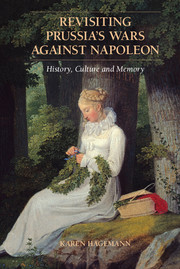Book contents
- Frontmatter
- Epigraph
- Contents
- List of Figures and Maps
- List of Abbreviations
- Acknowledgments
- Revisiting Prussia’s Wars against Napoleon
- Part One A History of Defeat, Crisis and Victory
- 1 The Defeat of 1806 and Its Aftermath
- 2 Reform and Revenge
- 3 Liberation and Restoration
- Conclusion
- Part Two Discourses on the Nation, War and Gender
- Part Three Collective Practices of De/Mobilization and Commemoration
- Part Four Literary Market, History and War Memories
- Part Five Novels, Memory and Politics
- Epilogue Historicizing War and Memory, 2013–1813–1913
- Bibliography
- Name Index
- Subject Index
- Plate section
Conclusion
Published online by Cambridge University Press: 05 March 2015
- Frontmatter
- Epigraph
- Contents
- List of Figures and Maps
- List of Abbreviations
- Acknowledgments
- Revisiting Prussia’s Wars against Napoleon
- Part One A History of Defeat, Crisis and Victory
- 1 The Defeat of 1806 and Its Aftermath
- 2 Reform and Revenge
- 3 Liberation and Restoration
- Conclusion
- Part Two Discourses on the Nation, War and Gender
- Part Three Collective Practices of De/Mobilization and Commemoration
- Part Four Literary Market, History and War Memories
- Part Five Novels, Memory and Politics
- Epilogue Historicizing War and Memory, 2013–1813–1913
- Bibliography
- Name Index
- Subject Index
- Plate section
Summary
The first two decades of the nineteenth century in Central Europe were decisively shaped by the political hegemony and military expansionism of the Napoleonic Empire. The new form of warfare already introduced during the French Revolutionary Wars – national war conducted with mass armies – which Napoleon retained after he assumed power in November 1799, left its mark on the age. It not only forced the princes of the ancien régime and their governments to make at times far-reaching reforms of army and state, and indeed even the economy and society, in the interest of defending or regaining full state sovereignty, but also shaped the process of political and cultural nation-building. In the German-speaking region, the form and content of this process were influenced in a highly ambivalent manner by experiences with the French Revolution and Napoleonic rule: many protagonists of the early national movement were well aware of the modernizing character of the Napoleonic reforms in the armed forces, society and state, and some of them even propagated elements of these reform ideas in modified form and adopted modes of political culture and national mobilization that had been successfully tested in Revolutionary and Napoleonic France, while still distancing themselves from the enemy with increasing vehemence in response to France’s policy of expansion. As the second part demonstrates, the early-liberal protagonists of the German national movement combined liberal political demands for themselves and their kind with national chauvinism, anti-Semitism and conventional views of the gender order, which they shared with conservatives of every stripe. Their nationalism, like the political thinking of most conservatives, also bore a thoroughly Christian stamp. Such ambivalences had a lasting influence on the political culture not just of the era itself, but also of the entire nineteenth century.
- Type
- Chapter
- Information
- Revisiting Prussia's Wars against NapoleonHistory, Culture, and Memory, pp. 73 - 74Publisher: Cambridge University PressPrint publication year: 2015



